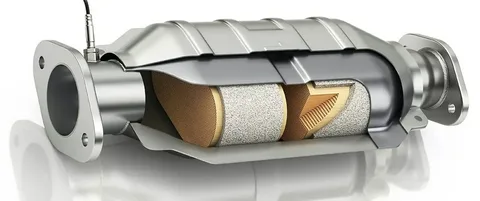In today’s automotive landscape, where environmental regulations are tighter than ever and performance standards are continuously rising, ensuring your vehicle’s emission control systems are functioning at their best is not just a matter of efficiency—it’s a legal and ecological imperative. Among the most critical components in this system are the Diesel Particulate Filter (DPF) and the catalytic converter. Over time, both can degrade or become clogged, leading to decreased engine performance, increased emissions, and potentially costly damage.
This article explores why DPF repair and replacing the catalytic converter are essential aspects of maintaining modern diesel and petrol engines, how they work, common failure signs, and what solutions are available to keep your vehicle running clean and efficiently.
What Is a Diesel Particulate Filter (DPF)?
A Diesel Particulate Filter (DPF) is a device fitted to the exhaust system of diesel vehicles. Its primary job is to trap soot and other particulate matter produced during the combustion process, preventing these harmful substances from being released into the atmosphere.
DPFs work by capturing the soot in a honeycomb-like structure and periodically burning it off through a process called regeneration. However, this system is not infallible. If the regeneration process fails or if the filter becomes clogged due to short driving cycles or poor fuel quality, the DPF can become blocked, triggering dashboard warnings and causing a loss of engine power.
Why DPF Repair Is Crucial
Ignoring a faulty DPF can lead to:
- Reduced fuel efficiency
- Engine derating or limp mode activation
- Permanent engine damage
- MOT failure
- Hefty fines due to emissions violations
A professional DPF repair service ensures that the filter is either thoroughly cleaned or properly replaced, restoring your vehicle’s performance and compliance with emissions standards.
DPF Clean Team, one of the UK’s leading specialists in DPF restoration, offers comprehensive services including diagnostics, cleaning, and on-site or mail-in repairs. With industry-leading equipment and techniques, they can bring even heavily clogged filters back to life, saving you from costly replacements.
Understanding the Catalytic Converter
The catalytic converter is another vital component in your vehicle’s exhaust system. It uses chemical reactions to convert harmful gases—such as carbon monoxide, nitrogen oxides, and hydrocarbons—into less harmful substances like carbon dioxide and water vapor before they exit the tailpipe.
Unlike the DPF, which primarily handles soot, the catalytic converter deals with gaseous emissions. It plays a central role in keeping your vehicle road-legal and environmentally friendly. However, just like the DPF, catalytic converters can degrade over time or become contaminated by engine oil, coolant, or unburned fuel.
When to Consider Replacing the Catalytic Converter
Common signs that your catalytic converter may need replacement include:
- Check Engine Light
- Rotten egg smell from exhaust
- Poor acceleration
- Reduced fuel economy
- Rattling noises under the car
If left unresolved, a failing catalytic converter can cause increased emissions, overheating, and even irreversible engine damage. That’s why Replacing the catalytic converter when needed is crucial for both vehicle health and legal compliance.
DPF Clean Team offers professional catalytic converter replacements using high-quality components compatible with a wide range of makes and models. Their experienced technicians ensure the new part is installed correctly and functioning optimally, helping you pass emissions tests and regain peak performance.
Benefits of Regular Maintenance and Timely Repairs
Keeping your DPF and catalytic converter in top shape offers numerous benefits:
1. Enhanced Fuel Economy
A clogged DPF or failing catalytic converter forces your engine to work harder, which increases fuel consumption. Repairs or replacements can help you save on fuel costs in the long run.
2. Improved Engine Performance
When the exhaust system works as intended, your engine runs more efficiently, delivering better power and responsiveness.
3. Compliance With Emissions Standards
Both components are essential for meeting EU and UK emissions regulations. Proper maintenance ensures your vehicle won’t fail its MOT or attract environmental fines.
4. Extended Vehicle Lifespan
By preventing soot buildup and toxic gas accumulation, you reduce wear and tear on the engine and other systems, thereby increasing the longevity of your vehicle.
5. Cost Savings Over Time
Timely repairs are always less expensive than major engine overhauls. Regular check-ups and early intervention can save thousands in future repair bills.
Choosing the Right Repair Partner
Whether you’re dealing with DPF blockage or a faulty catalytic converter, it’s essential to work with a trusted, experienced service provider. Look for specialists who:
- Use advanced diagnostic equipment
- Offer both cleaning and replacement options
- Provide warranties on parts and labor
- Have a strong track record and client testimonials
- Follow environmentally responsible disposal practices
DPF Clean Team checks all these boxes and more. With a nationwide network and commitment to quality, they’re an ideal partner for keeping your vehicle compliant, efficient, and roadworthy.
Final Thoughts
Modern vehicles, especially diesels, are designed with complex emission control systems that require ongoing care. The DPF and catalytic converter are not optional extras—they’re fundamental to how your vehicle functions, performs, and meets legal standards.
Failing to address issues with these components can lead to a cascade of problems, from reduced performance to significant financial loss. Fortunately, with the right maintenance partner like DPF Clean Team, you can take a proactive approach. Whether you need a thorough DPF repair or are considering replacing the catalytic converter, acting promptly can save you time, money, and stress while helping the environment.


